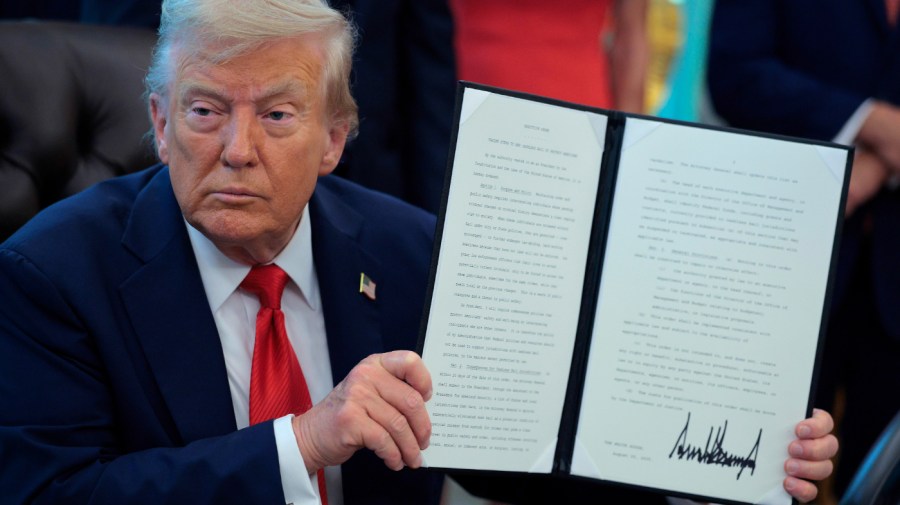Cashless bail is effective and humane, but Trump wants to end it

President Trump wants poor people to stay in jail when they are arrested, while still presumed innocent, even if it takes months or years before their cases come to trial.
He didn’t exactly put it that way, of course. But that would be the inevitable consequence of his campaign against cashless bail.
Trump announced an executive order last week to penalize cities and states that have limited or abolished monetary bail as a condition of pretrial release. He called cashless bail “a government-backed crime spree.”
With scant resemblance to reality, Trump declared, “Somebody kills somebody, they go and don’t worry about it … No cash. Come back in a couple of months. We’ll give you a trial. You never see the person again.”
In fact, jurisdictions with cashless bail, more accurately called “personal recognizance,” have no-show rates essentially the same as those requiring cash bail.
Illinois became the first state to fully abolish cash bail in September 2023. Under the Safety, Accountability, Fairness and Equity-Today Act, or SAFE-T Act, nearly all defendants are granted release without monetary bail, although some have check-in requirements or ankle monitors.
Importantly, judges may still order pretrial detention for those who pose “a real and present threat to the safety of any person or persons or the community,” or if the defendant represents a flight risk.
After eliminating money bail, Illinois’ no-show rate actually fell from 17 percent to 15 percent. Nor has there been an increase in crime, which continued to drop in Chicago. But the switch to personal recognizance did lead to a decrease in pretrial incarceration of defendants who would not have been able to pay their way out of jail.
In Washington, which has operated under a mostly non-monetary release system since 1992, about 11 percent of defendants miss court dates, which is consistent with the national rate for federal courts that set cash bail.
As always with Trump, there are serious legal and constitutional problems when he attempts to expand his personal power. Trump’s executive order directs every federal agency and department to “identify Federal funds, including grants and contracts, currently provided to cashless bail jurisdictions … that may be suspended or terminated.”
Significantly, the order is not limited to funding related to pretrial release programs, or even criminal justice, but rather threatens across-the-board elimination of grants and contracts to the targeted jurisdictions.
If actually pursued, such punitive manipulation of appropriated funds would encroach on Congress’s spending power under Article I of the Constitution.
As explained by legal scholar Ilya Somin, the Supreme Court has held that only Congress can impose conditions on federal grants, and the president may only enforce conditions clearly provided in the relevant legislation.
Under the 10th Amendment, even Congress has no authority over the states’ administration of their own criminal justice systems, including bail provisions.
So Trump is wrong on the facts and wrong on the law. But put that aside for now, and consider the very good reasons for eliminating cash bail, making it easier for defendants to secure pretrial release.
The monetary alternative, used in most jurisdictions, serves largely to keep poor defendants in jail simply because they cannot afford to ransom themselves from custody. The consequences can be devastating, as I learned very early in my career as a criminal defense lawyer in Chicago.
One morning in 1976, I was asked to represent a young woman, living on welfare with two pre-school age children. She had been arrested the previous night for stabbing her boyfriend. By the time I arrived at the courthouse, bail had been set in an amount she could not possibly meet.
When I interviewed her in the lockup, she was desperate to get home to her children, who had been taken in by a neighbor. She told me that her boyfriend frequently hit her and had started beating her as she made dinner the night before. Grabbing a kitchen knife, she stabbed him.
In 1976, “battered woman syndrome” was not yet a concept, much less a legal defense. Nonetheless, my client had a valid claim of self-defense against her much larger, habitually violent boyfriend.
I located the prosecutor and attempted to persuade him to dismiss the case, or at least agree to a recognizance bail. He was surprisingly sympathetic, but unwilling to go that far, given the serious injury to the hospitalized boyfriend.
Instead, he proposed a plea bargain. If my client would plead guilty that day, he would agree to a sentence of probation, and she could go home that afternoon. I thought that was coercive and unfair, but legal ethics required me to present it to my client.
I tried to explain the consequences of the deal, but of course all she cared about was going home to her children. The likelihood of acquittal didn’t matter to her at all, given that she would have to remain in jail for weeks or months, and maybe longer.
“If I plead guilty, I can go home?” she wanted to know.
“Yes, but you aren’t guilty,” I told her.
“I don’t care,” she replied. “I have to get home.”
She faced a terrible choice between returning to her children or asserting her compelling defense, solely because she could not post bail. Perhaps a more experienced lawyer could have figured something out, but I had to respect her decision.
Under today’s cashless system, my client would have been released on recognizance, free to raise her defense while still caring for her children. That would be humane and just, which is evidently what Trump wants to prevent.
Steven Lubet is the Williams Memorial Professor Emeritus at the Northwestern University Pritzker School of Law.